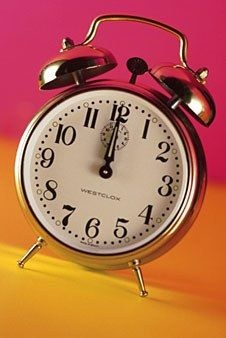
Bedtime Benefit: Weight Loss
"People who stay up late tend to eat late—and eat even when they're not hungry," says Evelyn Tribole, M.S., R.D., who cautions that the body stores (instead of burns!) calories taken in from late-night snack fests. Plus, if you binge at midnight, you're more likely to skip that all-important breakfast the next day. Translation: You'll have lower energy and be more likely to overeat later on, says Rafael Pelayo, M.D., associate professor of Sleep Medicine at Stanford University

Bedtime Benefit: Better Sleep
You may pride yourself on burning the midnight oil, but studies have shown that night-owl habits can actually lead to insomnia. And in addition to having a hard time falling asleep, you may also have trouble staying asleep.

Bedtime Benefit: a More Productive Morning
Even if you swear you're the polar opposite of a morning person, no one is biologically programmed to stay up late, says Pelayo. Hauling yourself out of bed earlier can result in higher energy levels in the A.M.—allowing you to squeeze in a workout or a productive extra hour at the office.

Bedtime Benefit: a Healthier Heart
According to researchers at the Misao Health Clinic in Gifu, Japan, participants in a study who went to bed after midnight were found to have significantly more arterial stiffening (an early sign of heart disease) than those who climbed into bed at a more reasonable hour.

Bedtime Benefit: More Energy
"Folks who are forced to live out of phase with the sun (i.e., night-shift workers) never really quite get used to it," says Kathy R. Gromer, M.D., of the Minnesota Sleep Institute. She says that those who get their shut-eye during the day often end up sleeping in two or three long "naps," instead of experiencing a continuous, deep REM-sleep phase, which may cause them to feel blah the next day.

Bedtime Benefit: Less Drinking
Going to bed earlier practically guarantees you'll drink less—a good thing for your health and your sleep. "[Alcohol] may make you drowsy at first and help you fall asleep, but then it will keep you in lighter, less restful sleep stages much of the night as the alcohol is metabolized," says Gromer.

Bedtime Benefit: a Better Workout
Good news: You may not need a personal trainer to reach your next fitness goal. In a study conducted at Stanford University, a group of athletes increased their sleep to 10 hours a night for a period of six weeks and saw their performances spike to an all-time high.

Bedtime Benefit: No More Caffeine Overload
You know the vicious cycle: You chug caffeinated drinks to stay awake, don't sleep well while the caffeine is working its way through your system and then reach for the java in the A.M to combat the effects of your late night and lousy sleep. "Caffeine has a 10-hour half life—meaning, it's only half gone 10 hours after you drink it," says Gromer. Go to bed earlier and you may be able to cut yourself free from the caffeine loop—and even save a few bucks while you're at it.



